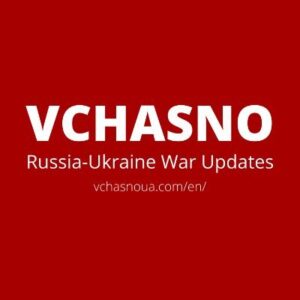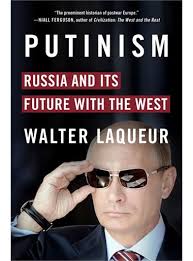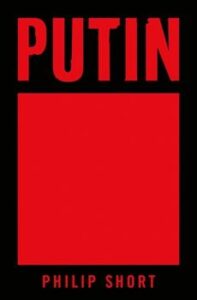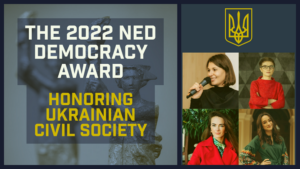Will the most consequential event of our time be the heroism of Ukrainian men and women fighting and dying for liberal democracy?
Putin calculates that as democracies’ aid to Ukraine wanes, pressure on Kyiv to accept a cease-fire will mount, allowing Moscow to claim victory on grounds that it holds significantly more Ukrainian territory than before the invasion, says Johns Hopkins Professor Hal Brands.
Yet the real imperative is psychological, he writes for The Washington Post. As military analysts Michael Kofman and Lawrence Freedman have argued, both sides are struggling to shape perceptions — each other’s and the outside world’s — of where this war is headed. Ukraine must show its Western backers that it can eventually win, so that they will stick with Kyiv and give it the wherewithal for more offensives in the future, even as the economic and military costs rise.
 Funding from non-profit foundations such as the National Endowment for Democracy (NED) and European Endowment for Democracy has provided support for the Ukrainian media outlet Vchasno, which is now banned in Russia and has suffered multiple denial of service attacks, Laura Oliver writes for the Reuters Institute.
Funding from non-profit foundations such as the National Endowment for Democracy (NED) and European Endowment for Democracy has provided support for the Ukrainian media outlet Vchasno, which is now banned in Russia and has suffered multiple denial of service attacks, Laura Oliver writes for the Reuters Institute.
Vchasno’s team is confident of a Ukrainian victory. When that day comes, its newsroom will focus on what it does best: journalism in the public interest. “After our victory, we will receive a lot of international support to rebuild our country,” Vchasno’s Olha Kyrylova says. “We plan to investigate how officials spend this money. But first of all, we want our victory, which we hope will come very soon.”
Ukraine can ultimately win a drawn-out war of attrition, experts suggest (above).
Alongside renewed American and European resolve, Ukraine’s courageous resistance has had the effect of reviving Western morale after an extended period of democratic crisis and seemingly inexorable authoritarian advance, notes Carl Gershman, NED’s former and founding president. Instead of appeasement and backsliding, which had become the norm, the Ukrainian people stood up and fought back with more courage, resilience, and success than anyone had expected, he writes for American Purpose, drawing on his Ralf Dahrendorf Memorial Lecture at the Estoril Political Forum:
British war studies expert Lawrence Freedman said recently that Western commitments are now such that “a Ukrainian defeat would look like a NATO defeat.” It would also be a defeat for democracy and the preservation of a stable world order. Putin is counting on the resolve of the United States and EU to weaken in the months ahead as energy prices rise and inflation and food shortages get worse. The danger of “Ukraine fatigue” is real. But given the stakes, and the fact that it is Ukraine that is paying the ultimate price to defend our values and security interests, this is a test that the West can and must meet. The alternative would be moral and strategic disaster.
In responding to Russia’s invasion of Ukraine, the West has rediscovered its manifold power, said Princeton’s Stephen Kotkin. But does it have a coherent strategy for victory?
 A few years after the collapse of the Soviet Union I was sitting with Walter Laqueur, a wise and erudite man, and one of the first analysts to write about “Putinism” and the rise of the new Russian right, and he remarked that it had been a long time since he had heard the word “strategy” in Washington, Leon Wieseltier recalls. “Geo-strategy,” he said, “has been replaced by geo-economics.”
A few years after the collapse of the Soviet Union I was sitting with Walter Laqueur, a wise and erudite man, and one of the first analysts to write about “Putinism” and the rise of the new Russian right, and he remarked that it had been a long time since he had heard the word “strategy” in Washington, Leon Wieseltier recalls. “Geo-strategy,” he said, “has been replaced by geo-economics.”
His words have haunted me, he writes for Liberties:
The meaning of strategy is an infamously complicated subject, and the co-existence within it of empirical and moral elements, of facts and purposes, the integration within a single “intellectual architecture” of all the dimensions of warfare, is hard to pin down. What I mean by it here is only this: a prior understanding of what we want, and why. This understanding must be developed quite consciously as a historical plan, as a program for action and a standard for readiness. RTWT
There are signs of growing military dissent within Russian ranks, analyst Fiona Hill observes in conversation with author and Times journalist Edward Lucas (above). There will be “considerable resistance” to growing conscription pressures, especially within the younger cohorts reluctant to serve.
“[Putin] is fearful of a repetition [in 2024] of what happened when he last returned to the presidency in 2011 and 2012, where we had protests in Moscow, St. Petersburg and other major [Russian] cities,” Hill said in an interview originally published by Foreign Policy:
“Russia is often ripe for protests, particularly on socioeconomic issues. Putin’s going to worry about that as we get toward 2024 for another reason: There are people around Putin who believe he’s not justified in having this next set of two terms. ….But the more weakened he is [and] the less legitimate he appears, the less it appears that he’s popular and the more incentive there is for others to try to maneuver around him to push on succession. Putin wants to get this conflict over with. He wants to seem legitimate.”
 In his new biography of Putin, Philip Short advances the Russian argument that America betrayed a “promise” by Secretary of State James A. Baker III in 1990 that NATO jurisdiction would not move “one inch to the east.” In fact, there was no promise, Peter Baker writes for The Times:
In his new biography of Putin, Philip Short advances the Russian argument that America betrayed a “promise” by Secretary of State James A. Baker III in 1990 that NATO jurisdiction would not move “one inch to the east.” In fact, there was no promise, Peter Baker writes for The Times:
Baker floated the idea during negotiations over reunification of Germany but later walked it back, and no such commitment was included in the resulting treaty that did extend NATO to East Germany with Moscow’s assent. By contrast, Short makes no mention of an actual promise Russia made in a 1994 agreement guaranteeing Ukraine’s sovereignty and forswearing the use of force against it, an accord Putin has obviously broken.
Indeed, Short accepts Putin’s explanation for his unprovoked invasion of Ukraine. “The State Department,” he writes, “insisted that the war had nothing to do with NATO enlargement and everything to do with Putin’s refusal to accept Ukraine’s existence as an independent state, which may have been good spin but was poor history,” Baker adds. Unless you read Putin’s own 5,000-word poor history published last year refusing to accept Ukraine’s existence as an independent state or remember that the invasion took place many, many years after the main NATO expansion and at a time when NATO membership for Ukraine was not seriously on the table.
 What can the United States and its NATO allies do to disabuse Putin of the idea that time is on his side? former NED board member Will Marshall asks in The Hill:
What can the United States and its NATO allies do to disabuse Putin of the idea that time is on his side? former NED board member Will Marshall asks in The Hill:
- First, they should speed up deliveries of advanced weapons to Ukraine. Biden has led the way, sending Kyiv $8 billion worth of military aid, including the HIMARS mobile rocket system. ….Britain and Poland also are major arms suppliers to Ukraine. But two major NATO powers, Germany and France, have been laggards. France, former NATO secretary general Anders Fogh Rasmussen tartly observes, has delivered only $160 million in military assistance, about the same as Denmark. These two EU leaders need to step up.
- Second, take swift advantage of Sweden and Finland’s decision to abandon neutrality and join NATO. Although he professes not to care, this is a huge strategic setback for Putin, as it means Russia will soon have a new, 800-mile northern border with NATO….
- Third, the Atlantic allies should publicly declare that they will never recognize the legitimacy of Putin’s land grabs in Ukraine (excepting Crimea, which Soviet leaders “gifted” to Ukraine)….
- Fourth, the allies should investigate and draw the world’s attention to Russian atrocities in Ukraine. Putin is employing the same barbarous tactics he used to crush the Chechen revolt in 1999 and pulverize anti-regime cities in Syria — indiscriminate shelling, airstrikes and cruise missile attacks intended to terrorize civilians…
- Fifth, Washington should ramp up liquified natural gas (LNG) exports to Europe. As EU leaders belatedly realize, their heavy reliance on Russian oil and gas has become a huge political vulnerability…..
Reliable sources, including @bellingcat, said a graphic video of Russian forces’ sexual mutilation & murder of a Ukrainian soldier is most likely genuine and not manipulated, @CathyYoung63 writes for @BulwarkOnline https://t.co/AeKhniiQny
— Democracy Digest (@demdigest) August 2, 2022







